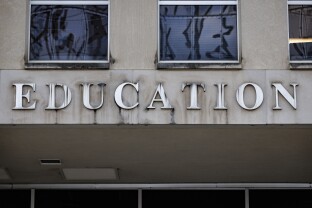The Department of Education can’t enforce its anti-diversity, equity and inclusion efforts in K-12 schools just yet.
A New Hampshire District Court judge Thursday granted a preliminary injunction to the National Education Association. Any entity that employs an NEA member is shielded from enforcement of the Education Department’s Feb. 14 “Dear Colleague” letter and the request for states and school districts to certify that they were following the Trump administration’s orders intended to end DEI in K-12 education.
Because the NEA has over 3 million members, the court order effectively immobilizes the Education Department’s ability to revoke funding based on its anti-DEI orders.
“While this interim agreement does not confirm the Department’s motives, we believe it should mark the beginning of a permanent withdrawal from the assault on teaching and learning,” Sharif El-Mekki, the CEO and founder of the Center for Black Educator Development, said in a statement. “Today’s decision is a critical step toward protecting the freedom to teach, and the freedom to learn.”
The Center for Black Educator Development and the American Civil Liberties Union were also part of the NEA lawsuit.
The lawsuit stems from the Feb. 14 “Dear Colleague” letter spelling out how the Trump administration interprets the legal obligations that K-12 entities have in connection with Students for Fair Admissions v. Harvard. The letter indicated that the administration viewed DEI programs as illegal. The suit was filed on the basis that the letter violated academic freedom and students’ and educators’ constitutional rights.
Thursday’s order blocks the enforcement of that letter and many of the anti-DEI efforts that have followed it, including an FAQ associated with the letter, the “End DEI” portal and the requirement that states and school districts sign a document assuring that they’re in compliance with SFFA opinion and Title VI, which was due April 24.
Several states expressed discomfort with signing the document. In a letter to the Department of Education, New York’s state superintendent argued that the agency didn’t have the authority to force states to comply with the administration’s interpretation of the Supreme Court decision and that there were no laws that prohibit DEI.
As of Wednesday, 16 states signed and returned the request, according to reporting from Fox News, with several citing the risks associated with losing federal funding.
“The U.S. Department of Education has issued guidance that requires my department to certify that all public districts and charters that take federal money use those funds according to that guidance, and that cannot be ignored. If I did, we would risk losing nearly $770 million in total federal funding to all public schools. That is obviously unacceptable,” Tom Horne, the Arizona state superintendent, told NOTUS in a statement. Horne added that he agrees with the Education Department’s directives regarding DEI.
A representative for the Montana Office of Public Instruction told NOTUS it didn’t have concerns about the order and had every local education agency sign and return the order to them in addition to having the local education agencies certify their compliance with Title IV last year in order to receive funding.
The Education Department hasn’t said exactly what the penalty would be for states that refuse to sign and return the document. Secretary Linda McMahon signaled on Wednesday that districts failing to do so put their funding at risk.
“It would not surprise me if they opened investigations to determine what kind of DEI activities may be ongoing,” said Jonathan Butcher, a senior research fellow with The Heritage Foundation. “Or the agency may say, ‘Look, we gave you the opportunity to comply with federal law, you’ve said you won’t, so we are prepared to withhold spending.”
Students for Fair Admissions, the plaintiff in the landmark supreme court decision restricting race-based college admissions, argued in an amicus brief against the notion that the Department of Education’s orders should give education entities reason to fear that their funding would be revoked based on “controversial viewpoints.”
“The Department’s guidance documents are not vague or arbitrary documents that will trample
on the First Amendment rights of Americans in schools,” the lawyers wrote. “The enforcement of civil rights in schools is fully consistent with the right of free speech, and nothing in the Letter or FAQ creates an objectively reasonable basis for schools or teachers to fear that the constitutionally protected expression of controversial viewpoints will cause them to lose federal funding or face discipline.”
The Department of Education is in the process of revoking federal education funding from the Maine Department of Education over its failure to comply with the Trump administration’s interpretation of Title IX, and has threatened numerous education entities with revocation of funds. The agency has also frozen millions in funds to many colleges and universities over DEI.
“All of this is meant to get us to stop and question something that is perfectly legal, something that is perfectly necessary, something that our democracy depends on,” said Analilia Mejia, co-director at Popular Democracy. “By making us stop ourselves to even assess whether or not we can do it, that’s a very effective way to curtail core elements of our democracy.”
The Department of Education did not immediately respond to requests for comment.
—
Violet Jira is a NOTUS reporter and an Allbritton Journalism Institute fellow.
Sign in
Log into your free account with your email. Don’t have one?
Check your email for a one-time code.
We sent a 4-digit code to . Enter the pin to confirm your account.
New code will be available in 1:00
Let’s try this again.
We encountered an error with the passcode sent to . Please reenter your email.


